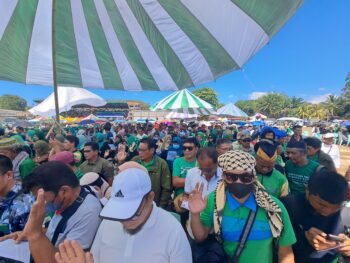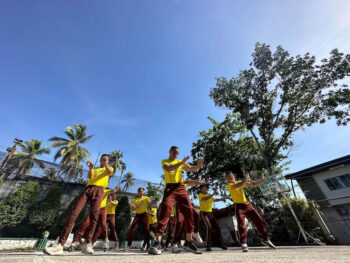
QUEZON CITY (MindaNews / 12 June) — New corruption charges were filed against Myanmar’s elected leader Aung San Suu Kyi this week, who has been under arrest since February 2021. According to the junta’s Anti-Corruption Commission, they have new evidence on top of previous charges that she had accepted accepted illegal payments of $600,000 in cash plus gold. According to the news, her lawyer, Khin Maung Zaw, said “Those who accuse her with greed and corruption are spitting towards the sky.”
I had a conversation with a Burmese civil society leader who is now in exile. Even as she feels that their situation is dire and that they lack international support, she remains committed to restoring democracy in Myanmar, even as she and her colleagues are threatened, facing death threats from the military junta ( thus I cannot reveal her name). Still, Burmese civil society are holding firm against the junta.
It seems that at least half of rally participants are women. She shared the actions of women in the anti-coup movement. News reports note some innovative ones such as wearing wedding dresses in a number of rallies, hanging women’s underwear across streets to insult and prevent the male dominated Myanmar army from advancing to the rally areas.
On “She Talks Peace,” I had an enlightening and encouraging conversation with Emma Leslie, the founder director of the Centre for Peace and Conflict Studies, supporting peace processes and conflict transformation in Asia. Emma is Australian-Cambodian and no stranger to Mindanao – she had served as a member of the International Contact Group (ICG) for a decade, supporting the Philippine Government – Moro Islamic Liberation Front (MILF) peace talks. Emma has been actively engaged in Myanmar for 25 years, and was one of 1000 women nominated for the Nobel Peace Prize in 2005, profiled by KACIID as a ‘hero of dialogue.’ Emma recently founded Dialogue Australia and will soon release a podcast – “Peacebuilder Who Pack a Punch.”
I asked her if she was optimistic about a way forward for Myanmar. She says she is – she has to be, as that’s part of the job of a peace builder. However, I wondered if the junta – described by Emma as a hierarchical, patriarchal group – really has much interest in a peace process.
Emma talked about the role that Burmese women play in the anti-junta movement. She has nothing but admiration for them. According to the news, half of the participants in protests last year were women. Emma is encouraged that the women are the ones asking critical questions. She highlighted two Burmese women who were cited as part of the Top 100 Influential Persons in the world by Time Magazine last year. Esther Ze Naw Bamvo and Ei Thinzar Maung who belong to the Karen ethnic group, led people on the very first anti-junta protest in Yangon in February 2021. Esther, a leader of the Kachin Peace Network, was one of the few people who spoke up for the Rohingya. Ei Thinzar has been named as Myanmar’s youngest-ever deputy minister in the shadow government, the National Unity Government.
Then there are the fallen. Mya Thwet Khaing , the first martyr who was shot in the head last February 2021when the military forces opened fire to disperse a peaceful anti-coup demonstration for democracy. According the news reports, she was targeted because she was wearing a red t-shirt, a symbol of Aung San Suu Kyi’s National League for Democracy party. Angel or Kyal Sin, a 19-year-old wearing a t-shirt with “Everything will be OK” printed on it, was shot in the head last March 2021. She and her t–shirt have become a symbol of defiance against the junta.
The ASEAN initiative to establish a Regional Plan of Action on Women, Peace and Security (WPS) is an excellent step forward. Emma has admiration for the commitment and work done by Cambodia, ASEAN Chair for 2022, on WPS. The ASEAN Committee on Women (ACW) recently had its 2ndTechnical Working Group Meeting on the proposed Plan, getting inputs from expert resources like former Peace Adviser Ging Quintos-Deles and Panel Chair Iye Coronel-Ferrer and many others to ensure that the Plan becomes an effective initiative to ensure women’s participation in peacebuilding, conflict resolution and peace processes – such as what is clearly needed in Myanmar. (#WPSASEAN)
Emma is also fascinated by the role that the youth are playing in Myanmar. Youth organizations have pushed the ASEAN and the international community to focus on Myanmar, to send peace keepers and monitors. ASEAN foreign ministers have become more engaged. ASEAN has done an extraordinary job in setting benchmarks – the five consensus points that the junta had agreed to: immediate end to violence in the country; dialogue among all parties concerned; the appointment of a special envoy; provision of humanitarian assistance by ASEAN; and a visit by the bloc’s special envoy to Myanmar to meet with all parties. However, it was a rude shock to many ASEAN leaders that the junta has not honored the consensus points.
The Burmese people, particularly the youth, are fatigued by ineffective peace processes . Emma says the young leaders are no longer interested in the frameworks or tools that we peacebuilders have been using, not keen on dialogues or peace talks. They don’t want to sit down with the military. They want to build new, not go back to what they had, which didn’t serve them well. Essentially , they are “exploring a 21st century way forward,” says Emma.
The organizing by youth is both encouraging and frightening. Emma relates their belief that they have to protect our communities themselves, since the international community can’t seem to move the junta to the peace table. The young have organized defense forces, growing a national army from ground up. Some of these community groups are autonomous, some are more organized with a hierarchy covering several communities. Some have become mechanisms for revenge. They are building the Burma Peoples Liberation Army, unique in Asia. Encouraging for their commitment and energy, scary for the potential impact on regional security and stability.
How do we reach them? Emma cites the role that internet and connectivity play, so powerful that the military cannot shut them down. These groups meet and connect and plan virtually. Even the shadow government -the National Unity Government – is able to behave as though they are THE government, connected as they are to the world outside Myanmar.
Is there a way to peace? To restoring democracy? Listen to Emma Leslie on “She Talks Peace”.
Please Click, Play and Listen on Spotify:
Apple Podcasts:
(MindaViews is the opinion section of MindaNews. Amina Rasul is the President of the Philippine Center for Islam and Democracy, an advocate for Mindanao and the Bangsamoro, peace, human rights, and democracy)







